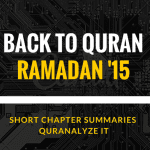What this project is: This Ramadan, rekindle your spirituality and relationship with God by reading the Quran in a language you understand! To facilitate those who find reading the Quran for the first time daunting, we, at Quranalyze It, will be posting short chapter summaries to get you acquainted with the basic theme and content of a particular chapter. It is important to note, however, that these summaries are no substitute to reading the Quran, and should be used as a bridge towards the Quran, or as an additional tool.
If you like the idea behind this project, and would like to read the summaries of the subsequent chapters in the coming days, then subscribe to our blog to receive an email whenever we publish a new summary. Please read, and share it far and wide!
The chapter theme seems like an amalgamation of the themes expressed in Ch2-4. However, this time, with a focus on the messenger and his relationship with the believers and disbelievers. All in all, Ch 2-5 details the core of Islam, with pretty much identical themes and content within them. The call “Oh you believed” appears 43 times between Ch2-5, showing the practical overtones of these chapters.
Beginning with an appeal to believers to fulfill all obligations as sacred, it puts forward ordinances about food, cleanliness, impartial justice, and pluralism. Murdering an innocent soul, stealing, false oaths, intoxication, gambling, superstitions of all kinds, hunting within the forbidden months, and inventing lies about God are condemned.
Here are some excellent thoughts on Chapter 5 from the book Introduction to the Quran: An Existential Reading by Farouk Peru:
1. Ch 5 is the only chapter which mentions the perfection of the islamic system (deeni kamil) in 5/3. During this perfection of system, many negative things are sanctioned from us and those who seek to oppress will give up in doing so.
2. Ch 5 has two calls to the messenger (5/41 and 5/67). This is not present in any other chapter. This shows the centrality of the messenger in this chapter and his role in leading the system. After each of these calls to the messenger, there are successive calls to believers (in 5/51, 5/54, 5/57 followed by calls after the second call to the messenger in 5/87, 5/90, 5/94, 5/95, 5/101, 5/105, 5/106). These calls represent stages or aspects of action in order to realise the system of the messenger in two successive stages (those of 5/41 and 5/67).
3. Ch 5 ends with the story of *isa* and the ‘table’ (the word ‘maidah’ refers to a state in which capacities are peaked). This symbolizes the system of Allah which is perfected in 5/3. In this perfection, the needs for self-actualization of all human beings are met and he is on course for the right judgment from Allah.
Passage Breakdowns:
Passage 1 (1-5)
- First call to believers: Fulfill your obligations.
- Second call to believers: Ordinances on lawful and unlawful food, and marriage.
Passage 2 (6-7)
- Third call to believers: Guidelines on ablution before Salat.
Passage 3 (8-10)
- Fourth call to believers: Stand up for justice, and be not partial.
Passage 4 (11-14)
- God made a covenant with “Bani Israel” and the “Nasara” but they breached it. This caused them to be arrogant, and misrepresent the Message.
Passage 5 (15-18)
- First call to People who possess the book: There has come to you an illuminating book that guides to *paths* of peace (Islam). Paths being in plural signifies no approach towards the Quran has a monopoly on truth.
- Further outlines the shortcomings of some “Hood” and “Nasara”.
Passage 6 (19-34)
- Second call to People who possess the book: Messenger has come to you who clarifies matters, lest you say “no warner” came to us.
- Narration about Musa and his people, his people signifying the lack of devotion to fight in the cause of God.
- Narration about two sons of *Adam*, leading up to the commandment that murdering an innocent soul is like murdering the entire mankind, and saving a soul is like saving the whole mankind. This, so that people do not forget the pivotal commandment of only killing in self-defense.
- The natural consequence of those who wage a war against “Allah and His Messenger” is that they are humiliated in one way or the other.
Passage 7 (35-40)
- Fifth call to believers: Attain Taqwa of God, and journey towards Him, if you seek to be successful in the long run (This was a central theme in Ch 2 and 3). This is better than acquiring all the material possessions in the world.
- Those who steal, cut off their capacities. However, if they sincerely repent, God will forgive them.
Passage 8 (41-50)
- First call to the messenger: Beware of hypocrites.
- Judge by Altaurat which contains guidance and light. Prophets, in plural, judged in accordance with it.
- A vital lesson on pluralism: God could have made you one Ummah, but he gave you different understandings of the same truth. Instead of fighting over this, hasten to do good.
Passage 9 (51-53)
- Sixth call to believers: Do not take protectors outside your ranks.
- Seventh call to believers: Do not turn back on your heels, because of the difficulties you suffer. Your real friends are God, His messenger, and those who establish connection and contribute to purification and are humble.
- Eighth call to believers: Do not take those who take your Deen as mockery and play as protectors. This, because these folks have no intentions of connecting with God.
Passage 10 (59-66)
- Say to the people who possess the book: Why do you blame us, when all we’ve done is that we’ve believed in God and embrace the book holistically? This sort of behavior is termed as “very immature and unevolved.” Those who are guilty of the trait mentioned above are labeled hypocrites and their “scholars” questioned over why they don’t reprimand them.
- Some Yahood say that “God’s hands are tied down” while they themselves are extremely stingy. God works through human beings, and since God repeatedly commands charity, is the hands of the people that are tied down that leads to poverty. *Very important distinction made here, a query most atheists put forward.*
Passage 11 (67-86)
- Second call to messenger: Make known all that is revealed to you. God will protect you from the aggressors.
- Criterion to heaven is not a specific religion, but some core beliefs: Belief in God, accountability, and reformation.
- Do not set up authorities with God.
- Both Eesa and his mother consumed food, and were like every other mortal. This is termed as a sign, for those who will give thought.
- Say to people who possess the book: Don’t commit excess in your Deen, and don’t follow erroneous views.
Passage 12 (87-89)
- Don’t forbid yourselves of the things God has made lawful for you.
- Oaths without deliberate intentions are not accountable. Oaths with deliberate intentions accountable. Expiation of these oaths outlined.
Passage 13 (90-93)
- Ninth call to believers: Intoxication, games of chance forbidden. Shaitan causes enmity and hatred between humans through these things.
- Obey God and the messenger. The messenger’s duty is to deliver the message to you, whether you follow it or not, is up to you.
Passage 14 (94-100)
- Ordinances on hunting during the forbidden months.
Passage 15 (101-109)
- Tenth call to believers: Don’t ask about things you have no knowledge of. However, if you ask these things while the Quran is being revealed to you, you will get the answers eventually. The negation of this commandment has lead many towards disbelief.
- When it is said to people to believe what God has revealed, they respond by saying that we will, on the contrary, follow what our forefathers followed.
- Eleventh call to believers: Individual accountability.
- Twelfth and last call to believers: Two people should witness the will you write before death.
Passage 16 (110-120)
- The chapter ends with the narration about Eesa, with a central focus on the Maaidah – which I take it to mean abundance and a feast for those involved in the project of Ch2-5.











